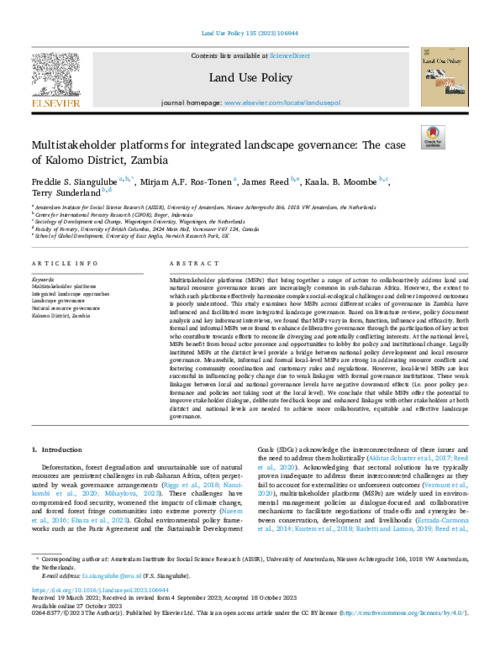Please use this identifier to cite or link to this item:
https://hdl.handle.net/20.500.12348/5763
Multistakeholder platforms for integrated landscape governance: The case of Kalomo District, Zambia
| dc.creator | Siangulube, F.S. | en_US |
| dc.creator | Ros-Tonen, M.A. | en_US |
| dc.creator | Reed, J. | en_US |
| dc.creator | Moombe, K. | en_US |
| dc.creator | Sunderland, T. | en_US |
| dc.date.accessioned | 2024-01-14T16:52:30Z | |
| dc.date.available | 2024-01-14T16:52:30Z | |
| dc.date.issued | 2023 | en_US |
| dc.identifier.citation | Freddie Siangulube, Mirjam Ros-Tonen, James Reed, Kaala Moombe, Terence Sunderland. (1/12/2023). Multistakeholder platforms for integrated landscape governance: The case of Kalomo District, Zambia. Land Use Policy, 135. | en_US |
| dc.identifier.issn | 0264-8377 | en_US |
| dc.identifier.uri | https://hdl.handle.net/20.500.12348/5763 | |
| dc.description.abstract | Multistakeholder platforms (MSPs) that bring together a range of actors to collaboratively address land and natural resource governance issues are increasingly common in sub-Saharan Africa. However, the extent to which such platforms effectively harmonise complex social-ecological challenges and deliver improved outcomes is poorly understood. This study examines how MSPs across different scales of governance in Zambia have influenced and facilitated more integrated landscape governance. Based on literature review, policy document analysis and key informant interviews, we found that MSPs vary in form, function, influence and efficacity. Both formal and informal MSPs were found to enhance deliberative governance through the participation of key actors who contribute towards efforts to reconcile diverging and potentially conflicting interests. At the national level, MSPs benefit from broad actor presence and opportunities to lobby for policy and institutional change. Legally instituted MSPs at the district level provide a bridge between national policy development and local resource governance. Meanwhile, informal and formal local-level MSPs are strong in addressing resource conflicts and fostering community coordination and customary rules and regulations. However, local-level MSPs are less successful in influencing policy change due to weak linkages with formal governance institutions. These weak linkages between local and national governance levels have negative downward effects (i.e. poor policy performance and policies not taking root at the local level). We conclude that while MSPs offer the potential to improve stakeholder dialogue, deliberate feedback loops and enhanced linkages with other stakeholders at both district and national levels are needed to achieve more collaborative, equitable and effective landscape governance. | en_US |
| dc.format | en_US | |
| dc.language | en | en_US |
| dc.publisher | Elsevier (12 months) | en_US |
| dc.rights | CC-BY-4.0 | en_US |
| dc.source | Land Use Policy;135,(2023) | en_US |
| dc.subject | multistakeholder platforms | en_US |
| dc.subject | integrated landscape approaches | en_US |
| dc.subject | landscape governance | en_US |
| dc.subject | natural resource governance | en_US |
| dc.subject | kalomo district | en_US |
| dc.title | Multistakeholder platforms for integrated landscape governance: The case of Kalomo District, Zambia | en_US |
| dc.type | Journal Article | en_US |
| cg.coverage.country | Zambia | en_US |
| cg.coverage.region | Eastern Africa | en_US |
| cg.subject.agrovoc | zambia | en_US |
| cg.contributor.affiliation | International Water Management Institute | en_US |
| cg.contributor.affiliation | Wageningen University & Research Centre | en_US |
| cg.contributor.affiliation | WorldFish | en_US |
| cg.contributor.affiliation | Center for International Forestry Research | en_US |
| cg.contributor.affiliation | University of East Anglia | en_US |
| cg.contributor.affiliation | The University of British Columbia, Faculty of Forestry | en_US |
| cg.contributor.affiliation | University of Amsterdam, Amsterdam Institute for Social Science Research | en_US |
| cg.identifier.status | Open access | en_US |
| cg.identifier.ISIindexed | ISI indexed | en_US |
| cg.description.theme | Miscellaneous themes | en_US |
| dc.identifier.doi | https://dx.doi.org/10.1016/j.landusepol.2023.106944 | en_US |
| cg.subject.actionArea | Resilient Agrifood Systems | en_US |
| cg.subject.impactArea | Environmental health and biodiversity | en_US |
| cg.contributor.initiative | Aquatic Foods | en_US |
Files in this item
This item appears in the following Collection(s)
-
Miscellaneous themes [906]
